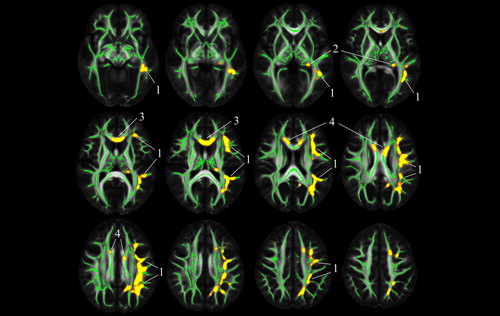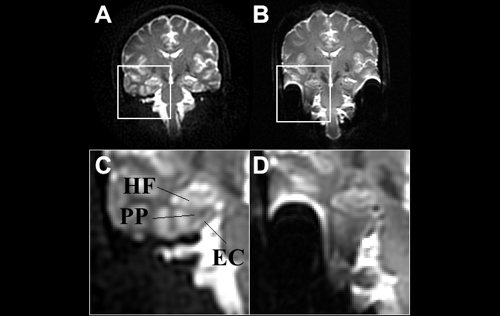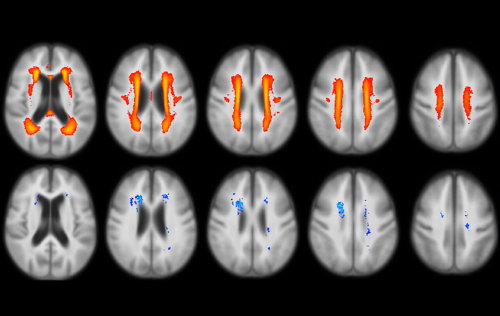Contributions
- We performed the first artifact-free DTI study of the medial temporal lobes in Alzheimer's disease and mild cognitive impairment, and demonstrated the sensitivity of the technique (2007).
- We have shown that higher levels of systemic inflammation are associated with lower structural integrity in the corpus callosum of non-demented older adults, and this may partially explain the lower higher-order visual cognition in aging.
- We have discovered functional connectivity differences between older adults with and without MCI using resting-state fMRI.
- We have demonstrated that more frequent cognitive activity in late life is related to higher diffusion anisotropy in a number of white matter regions, and that the association of late life cognitive activity with cognition may be partially mediated by brain diffusion characteristics.
- We have shown that higher levels of physical activity may reduce the effect of WMH burden on motor function in healthy older adults.
- We have demonstrated that in cognitively unimpaired older adults, vitamin D intake is associated with cortical thickness in regions vulnerable to Alzheimer's.
- We have shown that ARTS, our marker of arteriolosclerosis pathology, is associated with vascular risk factors, MCI, dementia, and stroke.
Understanding the complex role of brain characteristics in the mechanisms supporting cognitive health or leading to cognitive decline in old age is of critical importance. Towards this goal, we use multi-parametric MRI in studies of older adults to a) establish the array of brain characteristics integral to cognitive function in old age, b) uncover how these brain characteristics are influenced by genetic, demographic, lifestyle, neuropathologic and clinical factors, and c) probe brain integrity in preclinical stages of age-related diseases. Such investigations on older adults are fundamental to the development of strategies for the prevention of cognitive impairment.
Selected Related Publications
- Arfanakis K, Gui M, Tamhane AA, Carew JD. Investigating the Medial Temporal Lobe in Alzheimer's Disease and Mild Cognitive Impairment, with Turboprop Diffusion Tensor Imaging, MRI-Volumetry and T2-relaxometry. Brain Imaging and Behav 2007;1:11-21
- Arfanakis K, Fleischman DA, Grisot G, Barth CM, Varentsova A, Morris MC, Barnes LL, Bennett DA. Systemic inflammation in non-demented elderly human subjects: brain microstructure and cognition. PLoS One 2013;8:e73107.
- Han SD, Arfanakis K, Fleischman DA, Leurgans SE, Tuminello ER, Edmonds EC, Bennett DA. Functional connectivity variations in mild cognitive impairment: associations with cognitive function. J Int Neuropsychol Soc 2012;18:39-48.
- Fleischman DA, Yang J, Arfanakis K, Arvanitakis Z, Leurgans SE, Turner AD, Barnes LL, Bennett DA, Buchman AS. Physical activity, motor function, and white matter hyperintensity burden in healthy older adults. Neurology 2015;84:1294-1300.
- Arfanakis K, Wilson RS, Barth CM, Capuano AW, Vasireddi A, Zhang S, Fleischman DA, Bennett DA. Cognitive activity, cognitive function, and brain diffusion characteristics in old age. Brain Imaging Behav 2016;10:455-463.
- Lefèvre-Arbogast S, Dhana K, Aggarwal NT, Zhang S, Agarwal P, Liu X, Laranjo N, Carey V, Sacks F, Barnes LL, Arfanakis K. Vitamin D intake and brain cortical thickness in community-dwelling overweight older adults: A cross-sectional study. J Nutr. 2021;151:2760-2767.
- Fleischman DA, Arfanakis K, Leurgans SE, Evia AM, Lamar M, Kapasi A, Han SD, Poole VN, Wagner M, Bennett DA, Barnes LL. ARTS is associated with vascular risk factors, MCI, dementia, and stroke. Alzheimers Dement 2025;21:e70430.






